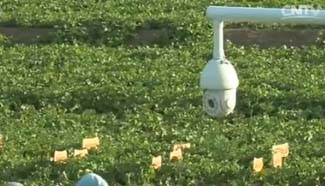WUHAN, July 11 (Xinhua) -- New pill-sized robots that patients swallow to perform endoscopies, or examinations of the digestive tract, have been put into use in more than 100 Chinese hospitals.
The robot, created by a Chinese joint venture company based in Silicon Valley, contains a magnetic positioning chip, a probe and a light.
As an alternative to a conventional endoscopy in which a probe is passed over the tongue and down the throat, the new technology provides a 360-degree examination of the patient's stomach in about 15 minutes, without causing discomfort.
"The inspection results are as good as a traditional gastroscopy, but the capsule robot is easier to control and cleaner, removing the risk of cross-infection," said Xie Xiaoping, a doctor at the endoscopy center of Wuhan Union Hospital.
China has a high rate of digestive tract disease. There have been about 400,000 new cases of stomach cancer in China in each of the past five years, accounting for 42 percent of fatalities from such cancer worldwide.
Success in treating the disease lies largely in how early it can be detected. But the discomfort associated with conventional endoscopies makes many people reluctant to have them, reducing early detection of stomach diseases, according to Xie.
A patient surnamed Li from Wuhan has suffered stomach problems for years, but fear of endoscopy prevented her from going to hospital. She recently had an examination via the capsule robot in Xie's hospital.
Xie said hundreds of patients like Li have had the inspection without any pain. They must fast for eight hours before the examination, and the capsule is excreted from the body afterwards.
Historically, capsule endoscopy products used in Chinese hospitals have all been imported, resulting in very high examination fees. Domestic products have greatly reduced the cost of an examination to about 3,000 to 5,000 yuan (450-750 U.S. dollars).
"Though the product is small, there are over 300 components and more than 100 patented items in each capsule," said Xun Dandan, a researcher with ANKON Technologies, the robot's developer.
Xun expects the cost of examinations with the capsules will drop over time.










